MC believes that respect for human rights is fundamental to conducting a diverse range of businesses globally. MC promotes fair and sound business activities based on the Three Corporate Principles, which have served as the Company’s corporate philosophy since its inception, and has been implementing initiatives to respect human rights in its Corporate Standards of Conduct, Social Charter, and the Mitsubishi Corporation Code of Conduct.
As part of its Midterm Corporate Strategy 2024, MC has established its own Materiality, a set of material societal issues to address through its business activities toward the goal of continuous creation of MC Shared Value. For MC, as a global company involved in businesses across a wide range of products and services worldwide, respect for human rights is a key management issue, and we address this under the material issues of "Promoting Stable, Sustainable Societies and Lifestyles” and "Respecting Human Rights in Our Business Operations."
Moreover, after reorganizing and clarifying our approach on respect for human rights and to promote efforts to do so, we formulated the following Human Rights Policy in February 2024, which has been approved by the Executive Committee and the Board of Directors.
We believe that respect for human rights is fundamental to our business *1Mitsubishi Corporation_Our Business*1 across the world. In an increasingly complex business environment, we face various human rights challenges. We believe that respecting and promoting human rights are directly linked to the sustainability of our business activities. Since our founding, we have been promoting fair and sound business activities based on our corporate philosophy, the Three Corporate Principles *2The Three Corporate Principles*2 . The Three Corporate Principles guide us in striving to enrich society, both materially and spiritually, while contributing towards the preservation of the global environment. We believe respect for human rights relates deeply rooted in our philosophy. Based on these beliefs, we have established this Human Rights Policy (hereafter “this Policy”), which represents our commitment to respect human rights throughout our business activities.
This Policy applies to all persons working for Mitsubishi Corporation. This Policy is shared with our group companies, and we will work together to ensure our adherence to this Policy, as well as to respect human rights throughout our business operations.
We recognize the importance of respecting human rights not only within our own business activities but also throughout our value chain. We will work together with our business partners, including our suppliers, to respect human rights in line with this Policy.
We support international norms on human rights, including the International Bill of Human Rights (Universal Declaration of Human Rights and International Covenants on Human Rights), the Declaration on the Fundamental Principles and Rights at Work of the International Labour Organization (ILO), the United Nations Guiding Principles on Business and Human Rights.
We comply with the local laws and regulations of the countries and regions in which we operate. In cases where there is a conflict between internationally recognized human rights principles and the laws and regulations of the country or region in which we operate, we will seek ways to honor the international principles.
We conduct human rights due diligence to identify, prevent and mitigate adverse impacts on human rights and engage with affected stakeholders where relevant. We pay special attention to vulnerable or marginalized individuals and strive to identify actual or potential adverse human rights impacts that our business activities have caused or contributed to.
We recognize the following as major human rights issues related to our business activities and will work to address them.
When we identify that our business activities have caused or contributed to adverse human rights impacts, we will remediate such impacts through legitimate processes.
In case if adverse impacts were directly linked to our operations, products, or services by a business relationship, we will endeavor to correct and remedy the situation by using our leverage.
We recognize that establishing a grievance mechanism, which consists of a series of processes to address internal and external stakeholder grievances, is crucial to identifying adverse human rights impacts concerning our operations and value chain. We will establish and operate grievance mechanisms to enable individuals and groups to show concerns about adverse human rights impacts caused by our business activities and seek remedies.
We will provide the necessary training and capacity building to ensure that our officers, employees, suppliers, and other business partners understand the importance of respecting human rights and put it into practice.
We ensure transparency by regularly and appropriately disclosing information on our human rights efforts and their progress.
We engage with relevant stakeholders through sincere and constructive dialogue to understand, improve and address human rights issues.
Our human rights efforts are overseen by the Corporate Functional Officer responsible for sustainability efforts and practices. Following deliberations by the Sustainability Committee, these efforts and practices are put forward or reported to the Executive Committee*3Management decision-making body*3 and the Board of Directors.
Established in February 1, 2024
MC understands that children are especially vulnerable to human rights abuses and that special consideration to respect their rights is necessary. MC also believes that respecting the rights of children allows them to better understand their own rights, which in turn contributes to their ability to become active members of society and leaders of future generations. With this understanding, MC supports the United Nations and ILO treaties
*The UN Global Compact, the Convention on the Rights of the Child, the Children’s Rights and Business Principles, the Convention concerning the Prohibition and Immediate Action for the Elimination of the Worst Forms of Child Labour (ILO Convention No. 182), etc.*
regarding children’s rights and has established internal policies for its employees to ensure that child labor is not tolerated and that children’s rights are respected. In particular, MC supports the four principles of the Convention on the Rights of the Child, including children’s survival and development rights, protection rights, and participation rights. As stated in the Mitsubishi Corporation Policy for Sustainable Supply Chain Management, MC will not employ any person who is under the minimum working age and will not engage in any employment that impairs children’s development. MC also supports the Children’s Rights and Business Principles, strives to prevent abuses of children’s rights in our business, and invests in social contributions through philanthropic efforts focused on children’s rights.
Through the Mitsubishi Corporation Policy for Sustainable Supply Chain Management, MC also expects its suppliers to conform to these standards by refraining from employing anyone under the minimum working age, and prohibiting children to work in any way that impairs their development.
In the context of its overall commitment to respecting human rights, MC pays special attention to upholding the rights of indigenous peoples, acknowledging their unique social and legal status under national and international laws, as well as their unique histories and cultural contributions throughout the world. When examining new business investment proposals, MC takes into consideration how the business operations may impact the rights of indigenous peoples and will consult with the relevant stakeholders. MC supports the United Nations Declaration on the Rights of Indigenous Peoples and the Indigenous and Tribal Peoples Convention (ILO Convention No. 169).
MC understands the importance of protecting its employees from dangers such as violence and preventing theft of assets throughout its business operations, and retains armed security services when deemed necessary. MC believes that the abuse of weapons by security forces involves a potential risk of human rights abuse. With regard to retaining armed security services, in addition to complying with the laws of the countries and regions in which it operates and adhering to international standards, MC also supports relevant international agreements*The UN Global Compact, the Voluntary Principles on Security and Human Rights, the UN Code of Conduct for Law Enforcement Officials, the UN Basic Principles on the Use of Force and Firearms by Law Enforcement Officials, etc.*.
MC issues statements in response to the UK Modern Slavery Act 2015 and the Canada Fighting Against Forced Labour and Child Labour in Supply Chains Act, which require companies to diclose actions taken to mitigate modern slavery in their supply chains.
FY2023 Modern Slavery Statement (UK) (PDF:676KB)Previous Modern Slavery Statement (UK)
FY2022 Modern Slavery Statement (PDF:700KB)Previous Modern Slavery Report (Canada)
FY2022 Modern Slavery Report (PDF:655KB)In MC’s management framework, human rights initiatives are overseen by the Corporate Functional Officer (CSEO) and Member of the Board/Corporate Functional Officer (Human Resources, Global Planning & Coordination, IT). The Sustainability Department and Global Human Resources Department plan and draft any related policies and measures. Following deliberations by the Sustainability Committee and Human Resources Development Committee, items are put forward or reported to the Executive Committee and the Board of Directors.
| Officers in Charge | Kenji Kobayashi (Senior Vice President, Corporate Functional Officer, CSEO) Yutaka Kashiwagi (Director, Executive Vice President, Corporate Functional Officer, Human Resources, Global Planning & Coordination, IT) |
|---|---|
| Deliberative Body (A subcommittee under the Executive Committee, a management decision-making body) |
Sustainability Committee, Human Resources Development (HRD) Committee Important matters related to human rights deliberated by the committees are formally approved by the Executive Committee and put forward or reported to the Board of Directors based on prescribed standards. |
| Departments in Charge | Sustainability Dept., Global Human Resources Dept. |
MC has established various consultation systems, including an internal human rights consultation desk and the whistleblowing system, so that any human rights concerns can be raised. These systems ensure that human rights-related concerns can be raised any time by mail, telephone or in person. These systems can be used anonymously and in confidence, ensuring the safety of the informant (no subsequent dismissal or other disadvantageous treatment), and that matters are handled and investigated by persons who have no conflict of interest in the matter. Solutions are offered with the utmost consideration of the informant’s wishes. Employees are informed about the systems during human rights awareness training at the start of employment, and information related to the systems is posted at all times on MC internal bulletin boards. MC also covers human rights issues in its annual compliance e-learning program to which all executives and employees (including full-time and part-time employees, secondees and temporary staff) are required to take. In addition, as part of a Groupwide compliance program, MC provides human rights training with information on the existence of the systems to employees who are transferred or seconded to affiliated companies.
In FY2023, MC received a total of 60 reports under the whistleblowing system, of which 39 were related to human rights, including harassment, labor management, etc. Compliance Officers shall conduct necessary investigations, giving due consideration to not infringing on the human rights and reputation of the persons involved. The results of the investigations are reported to the Chief Compliance Officer and used to plan and implement measures to prevent recurrence.
MC implements human rights and environmental due diligence on its operations as part of its commitment to identifying, preventing and mitigating any human rights violations or negative environmental impacts caused by the MC Group’s business activities, as well as to fulfill its responsibilities. As part of this due diligence, the Group has established and manages a consultation desk, which serves as a point of contact for external stakeholders to consult on cases where the MC Group's business activities are causing, or could potentially cause, a negative impact on human rights and/or the environment.
MC has established the Sustainability Advisory Committee which consists of three external experts. MC regularly seeks the diverse perspectives of this committee regarding MC’s human rights initiatives and other sustainability-related matters. In addition to regular committee meetings, committee members also visit business sites on an annual basis in order to deepen their understanding of MC’s sustainability efforts and provide advice from their own professional viewpoints.
MC’s current activities have expanded far beyond its traditional trading business to include project development, production, and manufacturing operations, working in collaboration with our trusted partners around the globe. Furthermore, since MC handles a wide range of products and services around the world, we believe that it is important to identify and analyze the negative impacts of our business on human rights and the environment, to ensure that such impacts are avoided/mitigated, and to fulfill our responsibilities. MC is conducting human rights and environmental due diligence with this in mind.
Value Chain of MC’s Business Activities
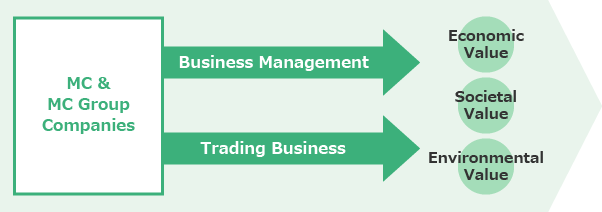
Human Rights and Environmental Due Diligence process for Trading Business
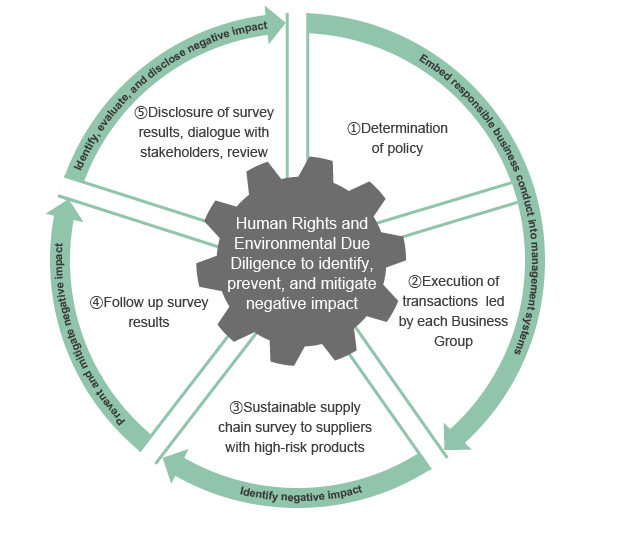

教育センターで学ぶ子どもたち

We provide training (such as programs geared toward specific levels of management including those for new employees, as well as training on trading practices) on our corporate philosophy, including respect for human rights and relevant guidelines.
| Scope | Total Time Spent | Percentage of Training Participants*Average rate of participation for each training course* |
|---|---|---|
| Non-Consolidated Officers and Employees | 5 hours | 97.1% |
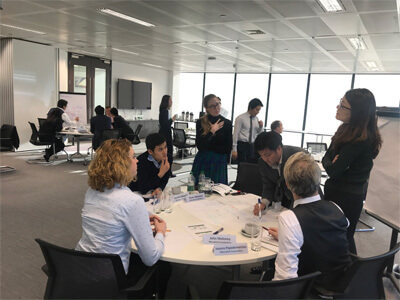
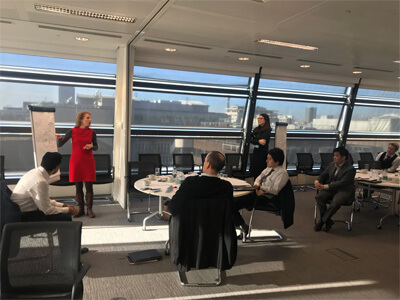
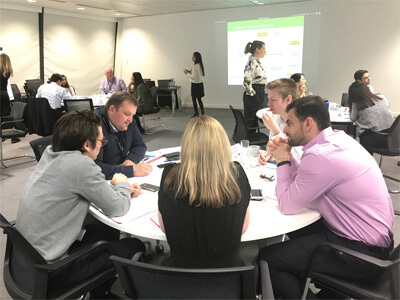
From FY2023, MC is supporting the “Clontarf Academy National Participant Funding Program,” which assists self-reliance of the indigenous youths. The Clontarf Foundation aims young Aboriginal and Torres Strait Islander men to finish the secondary education by opening the Clontarf Academy in public schools all around Australia, offering a program to assist them to achieve better educational outcomes.
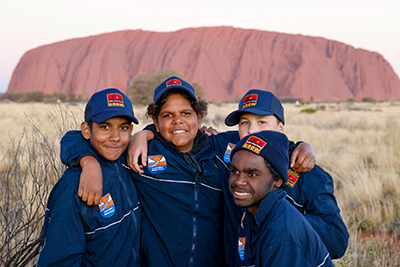
Please refer to the link below for details of the program.
MC regularly participates in the UN Forum Business and Human Rights in order to learn the latest developments in this field. At the November 2023 meeting of the forum in Geneva, Switzerland, staff from MC engaged in discussions on human rights initiatives with human rights experts and other attendees.
Staff from MC also participated in the B+HR Academy in October 2022, together with representatives from MC Group subsidiary companies Toyo Reizo Co., Ltd., MC Agri Alliance Ltd., and MC Fashion Co., Ltd. The B+HR Academy is a human rights due diligence training program for Japanese companies run by the United Nations Development Programme. It consists of a two-day course of lectures from both Japanese and overseas experts as well as group discussions among participants. The MC staff who participated in this program were able to gain an overall appreciation of the various international standards that serve as the foundation for human rights due diligence, as well as a deeper understanding of the specific processes that are used in this field.
From July to October 2024, members from MC’s Sustainability Department and business groups participated in a program entitled "Business and Human Rights: The Human Resource Development Program to Promote Responsible Corporate Behavior" which was facilitated by a lecturer from the International Labour Organization (ILO) Japan Office. The program was comprised of five sessions given by experts, as well as group discussions with other participants and the drafting of a plan to promote business and human rights within the company and the wider industry. This, in turn, gave participants an opportunity to deepen their understanding of international human rights and labor standards, human rights due diligence, and the specific processes involved in implementing them.

